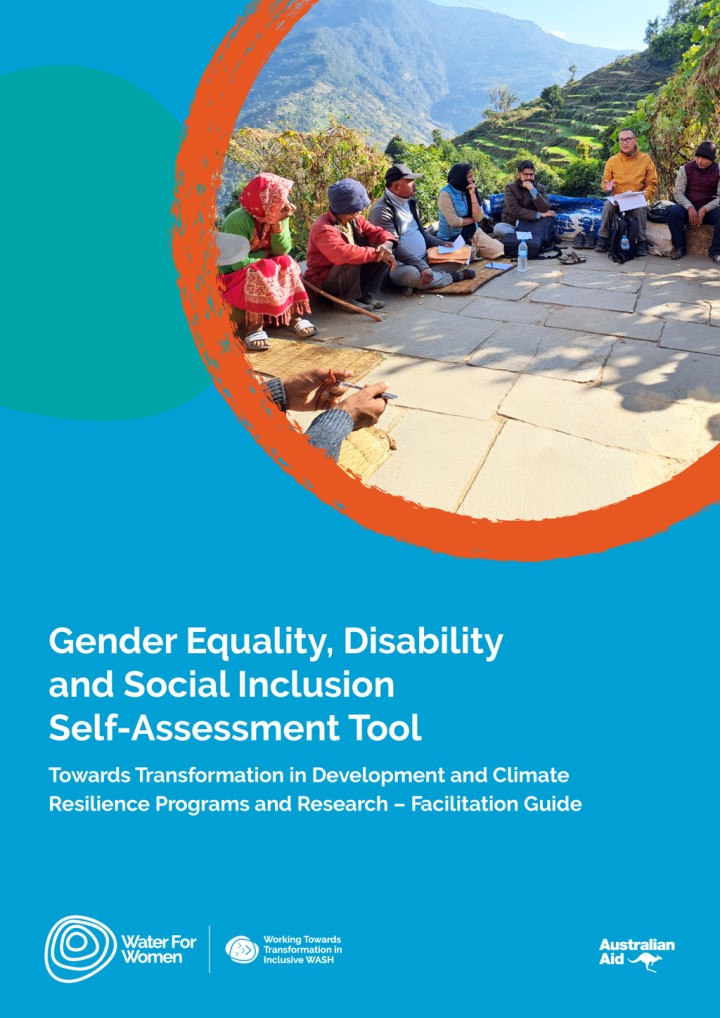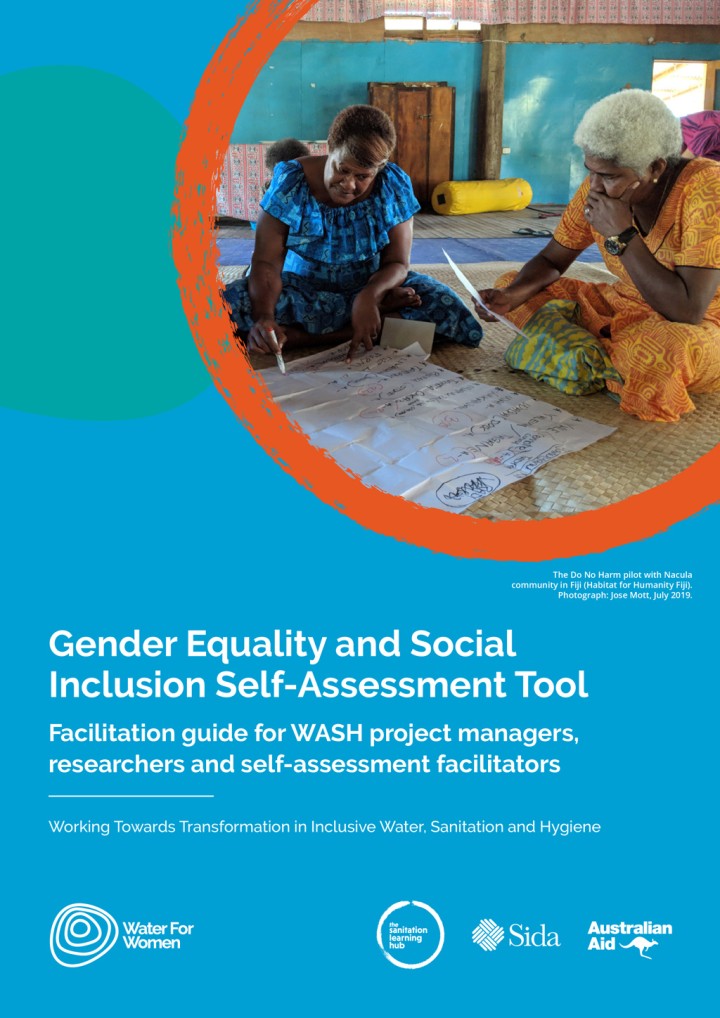Monitoring, evaluation and learning can also take unconventional approaches seeking to understand experiences and impact, triangulating information in diverse ways.
Tools
GEDSI SAT
The Gender Equality, Disability and Social Inclusion Self-Assessment Tool (GEDSI SAT) is a facilitation guide for climate resilience and development program managers, GEDSI advisers, researchers and interested members of staff, designed to support individual and collective reflective practice on the extent and quality of gender equality, disability and social inclusion work in programs and organisations. Drawing on a wealth of experience from across Water for Women projects, partners and cross-sectoral collaborators, and building on the WASH-focused GESI SAT co-created by Water for Women and the Sanitation Learning Hub in 2021, this revised cross-sectoral GEDSI SAT has an explicit climate resilience focus and is grounded in locally led approaches and deep learning.
The SNV Bhutan team undertaking the SAT pilot with Water for Women GESI advisers
© Joanna Mott, February 2019
Community members conducting a participatory resource assessment, supported through CFAR's WfW project Building Climate-Resilient WASH for Climate-Impacted Vulnerable Populations
© CFAR archives 2024
WASH - GEM
The Water, Sanitation, and Hygiene – Gender Equality Measure (WASH-GEM). The WASH-GEM is a novel quantitative measure designed to assist practitioners and researchers in exploring gender outcomes associated with WASH programs for women and men.
Learn more here.
© Jess MacArthur
qualKit
The qualKit web-based resource has gathered and modified various qualitative monitoring, evaluation, and learning (MEL) methods for both remote and in-person project tracking, learning, and evaluation activities, and includes a section on a range of the latest digital tools which can be used for qualitative data collection and analysis.
Learn more here.
A 3-stack card sorting interview in eastern Ethiopia on hygienic behaviors
© Jess MacArthur 2024
A women's focus group discussion card sorting activity in southern Zimbabwe depicting a ladder of sanitation cards
© Jess MacArthur 2022
A men's focus group discussion card sorting activity in southern Zimbabwe depicting a sanitation ladder
© Jess MacArthur 2022
A women's focus group discussion card sorting activity in northern Bangladesh depicting a ladder of sanitation cards
© Jess MacArthur 2014
A card sorting activity in northern Bangladesh depicting the respondent's dream latrine
© Jess MacArthur 2014
A men's focus group discussion card sorting activity in northern Bangladesh depicting a ladder of sanitation cards
© Jess MacArthur 2014
Juliet Willetts
Professor & Research Director
UTS • Australia
Professor Juliet Willetts leads applied research to improve development policy and practice, addressing social justice and supporting sustainable development. She is a recognised expert in water and sanitation in Asia and the Pacific, also making significant contributions to gender equality, climate resilience, governance and accountability, urban development, monitoring, evaluation and development effectiveness.
Dr. Alison Baker
Fund Manager
Water for Women • Australia
Dr. Alison Baker has been in the role of Fund Manager for the Australian Government funded Water for Women Fund (2017-2025) for its duration. Through Water for Women, Alison has presented and facilitated sessions at national, regional and global events including Stockholm World Water Week, COP27, and the UN Water Conference 2023. She has worked in the international development sector with GHD Pty as both a manager and practitioner for over 25 years. Alison has successfully delivered projects for bilateral and multilateral donors, focussed on the infrastructure, water, sanitation, climate change and environment sectors.
Joanna Mott
GEDSI Adviser
Water for Women • Australia
Joanna Mott is a GEDSI specialist with over 25 years’ experience in international development, humanitarian, and emergency response programs. She has led and supported gender, disability, and social inclusion initiatives across Asia and the Pacific, including long-term roles with the Australian Government’s Water for Women Fund and the BESIK WASH program in Timor-Leste.
Her expertise includes GEDSI program design, monitoring and evaluation, and capacity strengthening.


